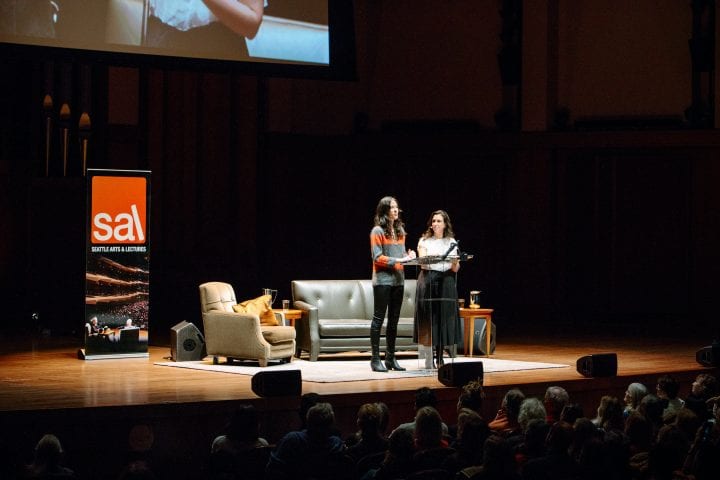
How to Confront a Bully: A WITS Student Reflects on “She Said”
February 24, 2020
Today, February 24, marks a watershed in the #MeToo movement—a Manhattan jury has found former Hollywood producer Harvey Weinstein guilty of sex crimes. To reflect upon the moment, we’re sharing an essay from Akshaya Ajith, a ninth grader at Overlake High School and a former Writers in the Schools student.
Akshaya attended SAL’s Literary Arts Series event with Jodi Kantor and Megan Twohey on January 29. These two journalists originally broke the story of the Weinstein investigation in the pages of the New York Times—Akshaya’s thoughts on their book about the events that unfolded, She Said, and their SAL talk, follow.
By Akshaya Ajith, SAL Volunteer
It’s been over two years since Meghan Twohey and Jodi Kantor published the Harvey Weinstein story. It’s been more than two years since the story ignited an overwhelming call for accountability, which spread in the form of the #MeToo movement. And, it’s been more than two years since it unleashed change over America and the world, awakening women’s voices and finding impact in their stories. But the world has begun to ask themselves: when is enough, enough?
It’s a complicated question, and one that Meghan Twohey and Jodi Kantor wrestle with themselves. Does sexual harassment categorize bad dates? Catcalling? Does #MeToo cover the broad range of sexual misconduct? There isn’t a unifying answer. Some may say that #MeToo has started a churning production of rocky claims that do not have strong evidence to back them up. In contrast, others say that even in the era of #MeToo, women’s stories continue to rack up disbelief and refusals to take them seriously.
In their book, She Said, Twohey and Kantor unpack “the story behind the story”—that is, the story of their investigations into sexual misconduct. They grapple with accusations against Donald Trump and Brett Kavanaugh, as well those against Harvey Weinstein, whose accusers initially opened the floodgates of further sexual misconduct allegations in the national media.
These accusations had starkly different public reactions. Their Harvey Weinstein story was hugely impactful. As Kantor and Twohey said, “The fact that [sexual assault and sexual harassment] is happening to women in Hollywood shows that nobody is safe.” On the other hand, most accusers of sexual misconduct in the political arena are swept aside. Twohey and Kantor conclude that “when these stories play out in the political arena,” the women are forgotten, and “it turns into a holy war” where political leanings determine belief.
Journalism is increasingly under attack because of this “holy war,” even if the journalistic process is rigorous enough to ensure truthfulness. Twohey and Kantor spoke of the care they took to research their sources, to painstakingly corroborate facts so there would be no surprises during their investigation that could result in their entire piece being written off. Their trust in journalism’s capabilities, and for the potential for every story to create change, aided them in uncovering moving stories that women have felt pressured to keep in the dark.
“At a time where everything feels stuck, we want you to know that journalism and facts can win,” Kantor and Twohey said during their SAL talk. Today, two years after the story broke, it seems that it has. Their article has created a cycle of releasing impactful #MeToo stories, generating “constructive conversation.” Their Harvey Weinstein story “wasn’t just a story about one man; it was a much broader exposé into abuse.”
As the journalists revealed during their lecture, Weinstein’s attempt to stop the release of this story ranged from storming into the New York Times office and threatening a lawsuit, to hiring an organization of former intelligence agents from Israel called Black Cube. Weinstein attempted to intimidate sources, and Twohey and Kantor themselves. But, rising from his brute force and anger, is the courage of the reporters’ sources. Even with the possibility that the story could change their lives and ruin their careers, these women held steady.
Twohey recalls persuading Weinstein’s victims by acknowledging that “[they] can’t change what happened to you in the past,” but they “might be able to turn your private pain into some use.” It was this trust and bravery from sources that created a story that has impacted countless lives and shifted the attitude of the world on sexual harassment and assault. “I feel I am speaking out on behalf of women who can’t,” emailed Laura Madden, a former assistant at Miramax, as she agreed to be on the record. Madden went on to say that as a mother of three daughters, she believes she must make sure they never “have to accept this kind of bullying behavior.”
What will we tell our children about this chapter? When the next page turns over, how will we be remembered? #MeToo continues to make waves, and “the process always continues,” whether for the reporters themselves, uncovering new stories, or the growing spread of the #MeToo movement.
In its essence, #MeToo asks the question of how to confront a bully. That night, as roaring applause, laughter, and thought-provoking silence marked Meghan Twohey and Jodi Kantor’s appearance at Benaroya Hall, they answered how:
“You do it together.”
 Akshaya Ajith is currently a freshman at the Overlake School. She has been a WITS student for three years and continues to work with SAL as a volunteer. Akshaya has written two published poems, “Imperfect” and “I,” with WITS as well as a short story. She continues to write in her free time.
Akshaya Ajith is currently a freshman at the Overlake School. She has been a WITS student for three years and continues to work with SAL as a volunteer. Akshaya has written two published poems, “Imperfect” and “I,” with WITS as well as a short story. She continues to write in her free time.